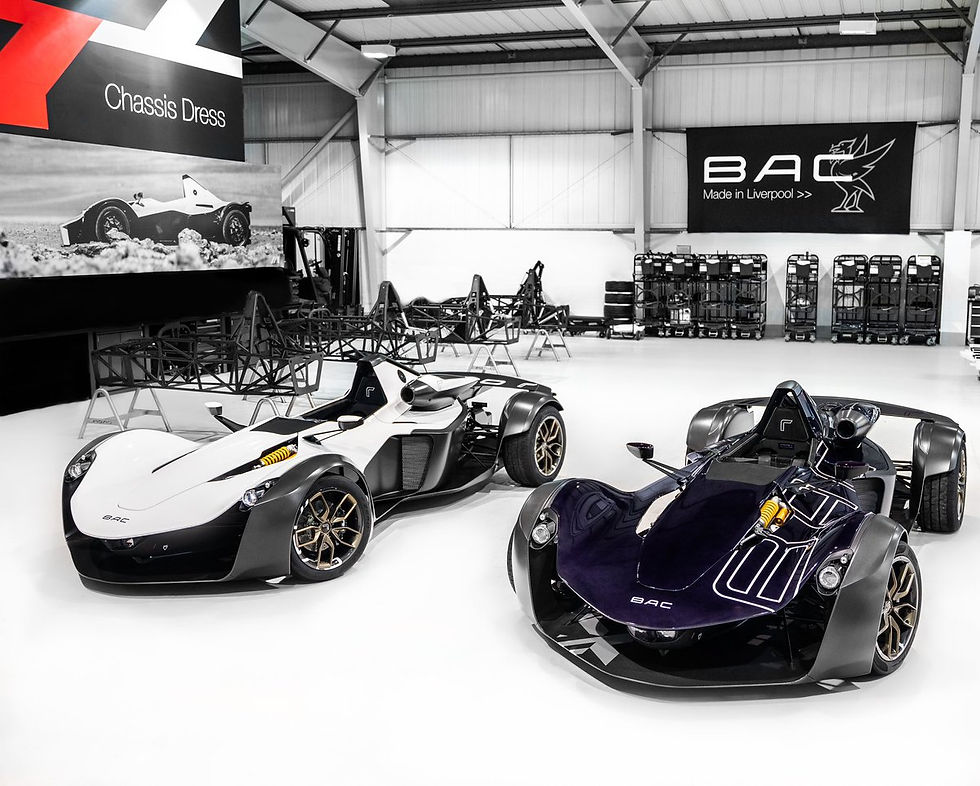Industrial Solutions
Briggs Automotive Company (BAC) was founded in 2009 by Neill and Ian Briggs, two brothers with a passion for the world of cars. Two years later, the company transformed the automotive industry with the world’s first road legal, single seater supercar – the BAC Mono. The Mono was the realisation of the brothers’ vision of a road vehicle that offers the most authentic and pure driving experience combined with the latest racing technology.
‘We set out to produce a car that was about the sport of driving, driving as a leisure activity,’ said Ian Briggs, design director and co-founder of BAC. ‘From an inspiration point of view, we looked at science fiction, robots, things from the future. For people like us who enjoy driving, we wanted to focus on a futuristic look and feel.’

Over time, the company has made significant improvements and upgraded the Mono. Meet the Mono R. Able to go from 0 to 62 miles per hour in 2.5 seconds, the Mono R is a true testament to the potential of modern manufacturing techniques.
Always on the cusp of technological advancements, BAC acts as an incubator for the latest innovations and groundbreaking concepts within its pioneering research and development projects.
To that end, it was an early adopter of 3D printing. Since the company designs and manufactures the Mono R for sports car enthusiasts and collectors, it produces small batch bespoke parts. As a result, CNC machining or injection molding was unnecessary for this level of production.
Instead, the team turned to UltiMaker. The UltiMaker 3D printing ecosystem has enabled BAC to produce fast and inexpensive highly customisable and high quality parts, delivering significant improvements in their design iterations, cost reductions, and overall manufacturing efficiency.
‘In the early days when 3D printing was referred to as rapid prototyping, we didn’t really understand the implications as production parts,’ said Ian Briggs, design director and co-founder of BAC. ‘But now over 44 different parts of the car are 3D printed now – structural engine components, wing mirror supports, light surrounds. We have really embraced 3D printing and the design freedom it has given us. The UltiMaker ecosystem allows us to bring all the different aspects of our production together to be constantly optimised and stored in one location.’

BAC engineers exclusively use UltiMaker 3D printers and is currently running three S5 3D printers. The company quickly produces and tests multiple design iterations, incorporating customer feedback or making refinements based on functional requirements. This iterative approach enables the creation of highly customisable parts that are optimised for performance, ergonomics, and aesthetics. Having on-demand access to the 3D printers allows BAC to produce parts as needed, reducing the need for large inventories of pre-manufactured components.
Utilising the UltiMaker Digital Factory, the company can centralise and streamline its 3D printing operations, from managing design iterations and print preparation to printing and post processing. Digital Factory allows the team to store its digital files, along with associated printing parameters, settings, and material specifications, ensuring that consistency and repeatability are maintained across multiple printing instances. With remote access, it can check and control the printers on the production line that operate on-demand 24 hours a day.
‘The UltiMaker Digital Factory has made it possible to improve manufacturing processes for prototyping for production parts on BAC,’ said Thomas Tunstall, bodywork technician and 3D printing operator. ‘For example, I can pre-slice print jobs and save them to the digital warehouse, which saves me a lot of time for future prints. Digital Factory also allows us to integrate the printers with our software, which allows me to remotely manage the printers, projects, and teams.’
The UltiMaker Material Alliance Programme has given BAC the flexibility to choose from a wide range of industrial grade materials that have been specifically tested, certified, and optimised for use with the UltiMaker 3D printers. This material versatility means that the company can select the most suitable material for each application. It exclusively uses Addigy materials for all 3D printed parts on the Mono R, including nylon carbon fibre for parts that require strong structural properties, such as the mirror arms which support wing mirrors and take a lot of force and the inlet runners from the air box.
Each Mono R vehicle is individually tailored to the customers' specifications. For example, the seat is molded to the driver, the steering wheel grips are moulded to the driver, the colour scheme of the car is chosen and even the race suits are made to measure. Everything is custom and 3D printing allows BAC to print many of the parts on the Mono R. Customers can even add their initials and car numbers directly onto the car and for the key fob.
With local support from UltiMaker GB and a wide network of resellers in the UK and Ireland, BAC can leverage the power of 3D printing, giving the team more design freedom to produce complex geometries that would be difficult or impossible to manufacture using traditional manufacturing methods.
‘As a manufacturer first stepping into 3D printing, one of the things that was super important to us was having local support. It was a journey for us. The machines were new, the materials were new, learning to design the parts was new. We would have waited longer to do had we not had the local support. That was really fundamental in us adopting this technology,’ Ian Briggs stated.

















Comments